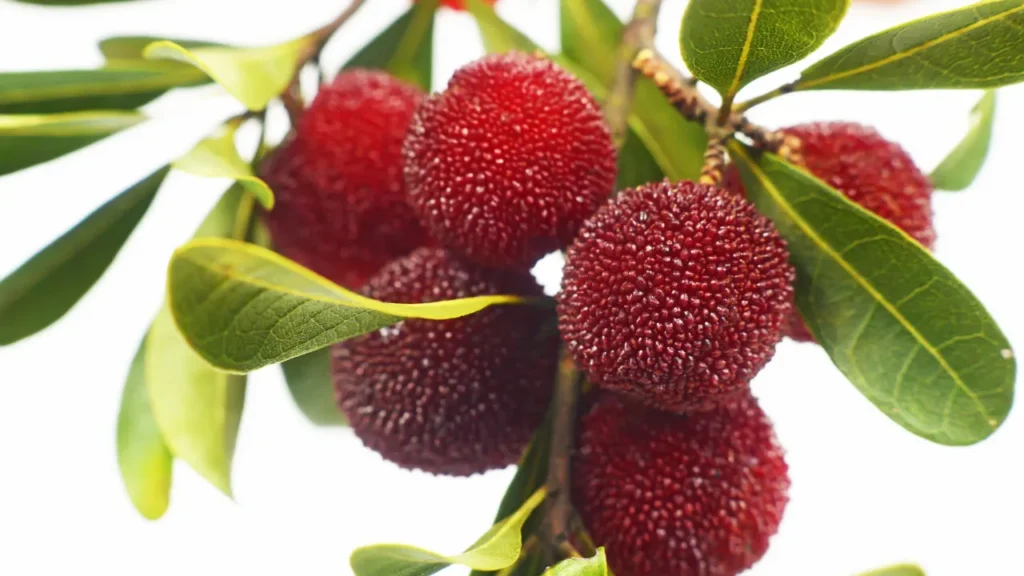Bayberry, or Myrica cerifera, is a small tree that grows in North America. It is also called wax myrtle or bay rum tree. This fruit is used in traditional medicine to treat colds and flu, ease pain, and improve blood circulation. In recent years, bayberry has become more famous as a dietary supplement because of its health potential. In this article, we’ll talk about what bayberry is, its health benefits, the best way to take it, possible side effects, drug interactions, and other useful information to use it safely.
You May Also Like:
Should You Try CBD for Focus? Here Are the Facts.
Diamond CBD Gummies vs. Joy Organics CBD Gummies
Bayberry: Benefits, Dosage, Side Effects, Drug Interactions, and Other Important Information is an original (NootropicsPlanet) article.
The Nature of Bayberry
Bayberry is a small tree that can grow up to 20 feet tall and is native to the coastal areas of the southeastern United States. The tree makes small fruits that look like berries wrapped in a waxy coating. The sticky substance is called bayberry wax, and it is used to make candles and soaps. For hundreds of years, people have used the tree’s leaves and bark to treat a wide range of illnesses.
Health Benefits of Bayberry
Bayberry has been used for a long time to treat colds and flu, pain, and bad circulation, among other things. In recent years, studies have been done to find out if bayberry could be good for your health. These include:
- Improves circulation: Bayberry has been shown to make the blood flow better, which can help people who have trouble with their circulation. This is because Bayberry has myricitrin and myricetin, which are known to widen blood vessels, improving blood flow.
- Getting rid of pain: Bayberry has been used to reduce pain and lessen swelling. This is because chemicals like myricitrin have been shown to relieve pain and reduce inflammation.
- Boosting the immune system: Bayberry has been shown to have immunomodulatory benefits, which means it can help boost the immune system.
- Bayberry also has strong antioxidant qualities that can help protect the body from damage caused by free radicals.

Chemistry of Bayberry
Bayberry, or Myrica cerifera, is a small tree that grows in North America with evergreen leaves. In recent years, bayberry has become more famous as a dietary supplement. The chemistry of bayberry is complicated, and it has many chemicals which play different roles in your health.
Here are some of the most important chemicals that bayberry contains:
- Myricitrin: Myricitrin is a vitamin found in bayberry. It has been shown to relax blood vessels, relieve pain, reduce inflammation, and improve the immune system.
- Myricetin: Myricetin is a flavonoid that is found in bayberry. It has been shown to have antioxidant benefits.
- Tannins: Bayberry has tannins, which may improve skin texture and reduce inflammation.
- Wax: Bayberry has bayberry wax which is used to make candles and soaps.
Bayberry may be good for your health in multiple ways, such as improving circulation, easing pain, boosting the immune system, and acting as an antioxidant. But it’s important to use Bayberry in a responsible way and talk to a doctor before taking it to make sure it’s safe and useful.
Physiological Mechanisms of Action of Bayberry
As previously mentioned, the effects of bayberry are complicated and the chemicals found in the plant can lead to different physiological changes and mechanisms of action. Below are a few of the most important ways bayberry affects the body:
- Improves circulation: Bayberry contains myricitrin and myricetin which have been shown to make the blood flow better, which can help people who have trouble with their circulation.
- Getting rid of pain: Bayberry has been used to get rid of pain and lessen swelling. Myricitrin has been shown to relieve pain and reduce inflammation by reducing the levels of prostaglandins in the body. Prostaglandins are chemicals that cause pain and inflammation.
- Boosting the immune system: Bayberry has been shown to have immunomodulatory benefits, which means it can help boost the immune system. The immune system is strengthened by the supplement, which helps the body fight off infections and diseases better.
- Bayberry has strong antioxidant qualities that can help protect the body from damage caused by free radicals. Free radicals can damage cells and tissues in the body.
In short, bayberry’s actions on the body are complicated and involve many different substances found in the plant. Together, these chemicals improve blood flow, ease pain, boost the immune system, and act as antioxidants.

Optimal Dosage of Bayberry
The best amount of Bayberry to take depends on the user and its specific usage. In clinical tests, 500–1000mg of bayberry extract per day was given to people with circulation problems, relieving pain, etc. It’s important to know that the FDA doesn’t control bayberry supplements. Before taking any new supplement, it’s best to talk to a doctor or nurse.
Side Effects of Bayberry
When taken in the right amounts, bayberry is usually thought to be safe. However, some people may have side effects when they take bayberry. Here are a few of the most common side effects:
- Problems with the intestines: Bayberry may cause stomach problems like nausea, diarrhea, and stomach cramps.
- Allergic Reactions: Bayberry may cause skin rash, itching, and spots in people who are allergic to it.
- Interactions with drugs: Some drugs, like blood thinners and blood pressure medicines, may not work well with Bayberry. Before taking Bayberry, you should seek healthcare advice.

Potential Substance Interactions with Bayberry
Some things, like medicines, alcohol, and other supplements, might not work well with bayberry.
- Medications: Bayberry may be combined with some medicines, such as blood thinners and medicines for high blood pressure.
- Alcohol: Bayberry might react with alcohol in a way that makes liver damage more likely.
- Supplements: Bayberry might not work well with some supplements, like vitamin K and iron. If you are already taking other vitamins, you should talk to your doctor before taking bayberry.
Best Responsible Use of Bayberry
The following which are listed show some of the responsible ways of using Bayberry:
- Talk to a healthcare provider. Before taking Bayberry, you should talk to a healthcare provider to make sure it is safe for you to prevent any possible interactions with medicines, alcohol, and other supplements.
- Take the recommended doses. It is important to follow the suggested dosages and not go over them. Taking too much bayberry could bring unwanted side effects.
- Don’t take Bayberry if you’re pregnant or nursing. It hasn’t been tested on pregnant or nursing women, so it’s not known if it’s safe for these groups.
- Keep an eye out for side effects and talk to a doctor or nurse if you notice any.
- Use High-Quality Products: Bayberry supplements are not controlled by the FDA, so it is important to use high-quality products that have been tested for their purity and potency.
Bayberry:
Conclusion
Bayberry (Myrica cerifera) is a type of resilient shrub found in North America that yields beneficial fruits. Its waxy berries can be used to improve blood circulation, reduce pain and swelling, boost the immune system, and improve overall health. Bayberry offers all these properties because it contains bioactive ingredients such as myricitrin, myricetin, and tannins. Aside from that, bayberry has also been traditionally used to make candles due to its waxy nature.
While its potential as a health supplement stands strong, you should seek advice from your doctors to know if bayberry is suitable to be included in your holistic routine. More studies need to be done on Bayberry to ensure its safe usage and also clarify all the potential substance interactions with this supplement to prevent negative side effects.

References:
- An Overview of The Nutritional Value, Health Properties, and Future Challenges of Chinese Bayberry. Retrieved from:https://www.ncbi.nlm.nih.gov/pmc/articles/PMC8900607/
- Recent Breakthroughs in The Antioxidant and Anti-Inflammatory Effects of Morella and Myrica Species. Retrieved from:https://www.ncbi.nlm.nih.gov/pmc/articles/PMC4581187/
- The Diarylheptanoid (+)-Ar,11S-Myricanol and Two Flavones from Bayberry (Myrica Cerifera) Destabilize the Microtubule-Associated Protein Tau. Retrieved from:https://pubmed.ncbi.nlm.nih.gov/21141876/
Important Note: The information contained in this article is for general informational purposes only, and should not be construed as health or medical advice, nor is it intended to diagnose, prevent, treat, or cure any disease or health condition. Before embarking on any diet, fitness regimen, or program of nutritional supplementation, it is advisable to consult your healthcare professional in order to determine its safety and probable efficacy in terms of your individual state of health.
Regarding Nutritional Supplements Or Other Non-Prescription Health Products: If any nutritional supplements or other non-prescription health products are mentioned in the foregoing article, any claims or statements made about them have not been evaluated by the U.S. Food and Drug Administration, and such nutritional supplements or other health products are not intended to diagnose, treat, cure, or prevent any disease.


